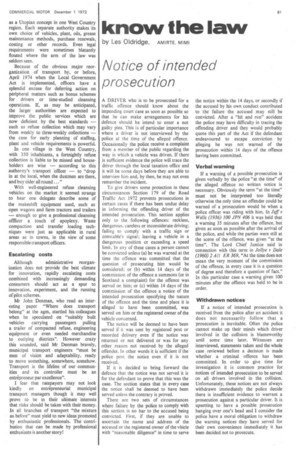know the law
Page 83

If you've noticed an error in this article please click here to report it so we can fix it.
by Les Oldridge, AMIRTE, IVIIMI
Notice of intended prosecution
A DRIVER who is to be prosecuted for a traffic offence should know about the impending court case as soon as possible so that he can make arrangements for his defence should he intend to enter a not guilty plea. This is of particular importance where a driver is not interviewed by the police at the time of the alleged offence. Occasionally the police receive a complaint from a member of the public regarding the way in which a vehicle was driven. If there is sufficient evidence the police will trace the driver through the local taxation office and it will be some days before they are able to interview him and, by then, he may not even remember the incident.
To give drivers some protection in these circumstances Section 179 of the Road Traffic Act 1972 prevents prosecutions in certain cases if there has been undue delay in informing the offending driver of the intended prosecution. This section applies only to the following offences: reckless, dangerous, careless or inconsiderate driving; failing to comply with a traffic sign or constable's signal; leaving a vehicle in a dangerous position or exceeding a speed limit. In any of these cases a person cannot be convicted unless (a) he was warned at the time the offence was committed that the question of prosecuting him would be considered: or (b) within 14 days of the commission of the offence a summons (or in Scotland a complaint) for the offence was served on him; or (c) within 14 days of the commission of the offence a notice of the intended prosecution specifying the nature of the offence and the time and place it is alleged to have been committed, was served on him or the registered owner of the vehicle concerned.
The notice will be deemed to have been served if it was sent by registered post or recorded delivery even if the notice was returned or not delivered or was for any other reason not received by the alleged offender. In other words it is sufficient if the police post the notice even if it is not received.
If it is decided to bring forward the defence that the notice was not served it is for the defendant to prove that this was the case. The section states that in every case the notice shall be deemed to have been served unless the contrary is proved.
There are two sets of circumstances where failure by the police to comply with this section is no bar to the accused being convicted. First, if they are unable to ascertain the name and address of the accused or the registered owner of the vhicle with "reasonable diligence" in time to serve the notice within the 14 days, or secondly if the accused by his own conduct contributed to the failure the accused may still be convicted. After a "hit and run" accident the police may have difficulty in tracing the offending driver and they would probably quote this part of the Act if the defendant endeavoured to escape conviction by alleging he was not warned of the prosecution within 14 days of the offence having been committed.
Verbal warning
If a warning of a possible prosecution is given verbally by the police "at the time" of the alleged offence no written notice is necessary. Obviously the term "at the time" must not be interpreted too literally otherwise the only time an offender could be warned of a prosecution would be when a police officer was riding with him. In Jeff v Wells (1936) 100 JPN 406 it was held that a warning 35 minutes after the offence, but given as soon as possible after the arrival of the police, and while the parties were still at the scene of the offence, was given "at the time". The Lord Chief Justice said in connection with this term in Tollye v Dale (1960) 2 All ER 369, "At the time does not mean the very moment of the commission of the offence, in every case it is a question of degree and therefore a question of fact." In this particular case a warning given 100 minutes after the offence was held to be in order.
Withdrawn notices If a notice of intended prosecution is received from the police after an accident it does not necessarily follow that a prosecution is inevitable. Often the police cannot make up their minds which driver involved in the collision is blameworthy until some time later. Witnesses are interviewed, statements taken and the whole case, reviewed before a decision is made whether a criminal offence has been committed. In order to give time for investigation it is common practice for notices of intended prosecution to be served on all drivers involved in the collision. Unfortunately, these notices are not always withdrawn immediately the police decide there is insufficient evidence to warrant a prosecution against a particular driver. It is upsetting to have a possible prosecution hanging over one's head and I consider the police have a moral obligation to withdraw the warning notices they have served for their own convenience immediately it has been decided not to prosecute.
































































































































